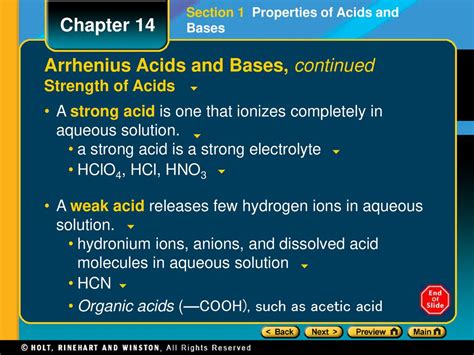The fascinating world of chemistry! In this article, we'll delve into the properties and reactions of a specific compound, HClO4, also known as perchloric acid. Our main focus will be to answer the question: Is HClO4 a strong acid?
To begin with, let's briefly introduce perchloric acid. HClO4 is a colorless, odorless liquid with a pungent, corrosive nature. It's a strong oxidizing agent and is commonly used in various industries, such as in the production of rocket fuel, explosives, and pharmaceuticals.
What Makes an Acid Strong or Weak?
Before we dive into the properties of HClO4, let's quickly review the definition of strong and weak acids. A strong acid is one that completely dissociates in water, meaning it fully ionizes into its constituent ions. On the other hand, a weak acid only partially dissociates, resulting in a mixture of ions and undissociated acid molecules.
Properties of HClO4
Now, let's examine the properties of perchloric acid:
- Molecular Structure: HClO4 consists of a hydrogen atom bonded to a perchlorate ion (ClO4-). This structure allows for the release of a proton (H+), which is a characteristic of acids.
- pKa Value: The pKa value of an acid is a measure of its strength. A lower pKa value indicates a stronger acid. HClO4 has a pKa value of -10, which is extremely low, suggesting that it's a very strong acid.
- Dissociation: As mentioned earlier, HClO4 completely dissociates in water, producing H+ and ClO4- ions. This complete dissociation is a hallmark of strong acids.
Reactions of HClO4
Perchloric acid participates in various reactions, including:
- Neutralization Reactions: HClO4 reacts with bases to form salts and water. For example, when HClO4 reacts with sodium hydroxide (NaOH), it forms sodium perchlorate (NaClO4) and water.
- Oxidation Reactions: As a strong oxidizing agent, HClO4 can oxidize various substances, including metals, nonmetals, and organic compounds.
- Hydrolysis Reactions: HClO4 can hydrolyze certain compounds, such as esters and amides, to form carboxylic acids and alcohols.
Is HClO4 a Strong Acid?
Based on its properties and reactions, the answer is a resounding yes! HClO4 is indeed a strong acid. Its extremely low pKa value, complete dissociation in water, and ability to participate in various reactions, including neutralization, oxidation, and hydrolysis, all support this classification.
Comparison with Other Acids
To put the strength of HClO4 into perspective, let's compare it with other common acids:
- Hydrochloric Acid (HCl): While HCl is a strong acid, its pKa value is slightly higher than that of HClO4, indicating that it's not as strong.
- Sulfuric Acid (H2SO4): H2SO4 is also a strong acid, but its pKa value is not as low as that of HClO4.
- Nitric Acid (HNO3): HNO3 is a strong acid, but its pKa value is higher than that of HClO4, making it slightly weaker.

Practical Applications of HClO4
Perchloric acid has various practical applications, including:
- Rocket Propulsion: HClO4 is used as an oxidizer in rocket fuel, providing a high-specific-impulse thrust.
- Pharmaceuticals: HClO4 is used in the production of certain pharmaceuticals, such as antibiotics and anti-inflammatory agents.
- Explosives: HClO4 is used in the production of explosives, such as perchlorates, which are used in fireworks and other pyrotechnic devices.
Safety Precautions
When handling HClO4, it's essential to exercise extreme caution due to its highly corrosive and oxidizing nature. Always wear protective gear, including gloves, goggles, and a face mask, and work in a well-ventilated area.
Gallery of Perchloric Acid





Frequently Asked Questions
What is the pKa value of perchloric acid?
+The pKa value of perchloric acid is -10.
Is perchloric acid a strong acid?
+Yes, perchloric acid is a strong acid.
What are some practical applications of perchloric acid?
+Perchloric acid has various practical applications, including rocket propulsion, pharmaceuticals, and explosives.
In conclusion, perchloric acid (HClO4) is a strong acid with a pKa value of -10. Its complete dissociation in water, ability to participate in various reactions, and practical applications make it a unique and important compound in various industries. Remember to exercise extreme caution when handling HClO4 due to its highly corrosive and oxidizing nature.
We hope you found this article informative and engaging. If you have any questions or comments, please feel free to share them with us.
